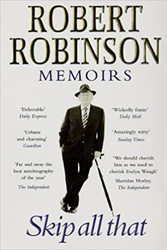In Robinson's memoir, Skip All That (1996), he professes his admiration for Reed's 1953 BBC radio comedy, A Very Great Man Indeed: It is, Robinson says, "the one wholly original contribution made by radio to the canon of English humorous letters."
Members of the same club in London, The Savile, Robinson reveals that, after getting to know each other, Reed presented him with a scrap of verse, now (along with some personal correspondence from Ezra Pound) among his prized possessions:

A Very Great Man Indeed was a fiction that accumulated round the figure of an innocent middle-aged literary gent who was trying to write the biography of a great writer. It was a Third Programme programme 'the ever-admirable Third Programme' as Michael Flanders, playing the part of a BBC commentator in the series, described it — and was transmitted in fifty-minute episodes. So intense were its comic flavours, so distinct were its characters, so remarkable was the understanding of the actors for the parts they played, that I became addicted. Henry Reed was the author, whose poem 'Today We Have Naming of Parts' and whose lampoon of the Eliot Quartets, 'Chard Whitlow', are imperishable items in the repertoire of post-war anthologies.Here is an obituary and remembrance of Robinson, from 2011.
The narratives grew out of Reed's chronic failure to get to grips with a long projected life of Thomas Hardy. The hapless biographer in A Very Great Man is called Herbert Reeve, though the people he meets in the course of his researches very often get this wrong and call him Reeves, Treves or even Breve. As in Toytown the characters are amiable, grotesque, recognisable, the two principal figures being General Gland, the foot fetishist and bell fancier, who in moments of stress pronounces 'd' as 'b' (e.g. 'Breadful!') and the composeress Hilda Tablet whose 'musique concrete renforcee' is the talk of the avant-garde. The General's portrait, painted in the nude by R. Bunnington Benningfield ARA hangs in his hall. 'Breadfully realistic, isn't it?' asks the General glumly, as he shows it to Reeve, 'apart from being fourteen feet high, of course.' Hilda's nine-act opera Emily Butter is set in a department store and on the first night at Covent Garden the curtain finally comes down in the small hours of the morning.
Reed made these figures, and many others, sound like your own relatives, a gift he shared with S.G. Hulme Beaman, creator of Toytown, and with the great Beachcomber, and with Lewis Carroll. Reed was a melancholy recluse, and I would meet him from time to time at the Savile Club where he would listen to my enthusiastic prattle about a work which I still feel is the one wholly original contribution made by radio to the canon of English humorous letters. Reed was pleased enough with this succès d'estime and knew how much he owed to the craft of Douglas Cleverdon who was the producer, and to the sensitivity of such actors as Derek Guyler (creator of General Gland, and also of a minor character, Mr Gabriel Hall Pollock, the music critic, whose glottal pronunciation of the word 'beauty' was much prized), Mary O'Farrell (Hilda) and Hugh Burden (Herbert Reeve). But this saturnine figure was never cheerful, and as men left the Club to catch their last train, he would wander off to his bachelor apartment in Montagu Street, expecting (I always thought) the worst. One night before he left he wrote out a verse for me a verse he had dreamt:
Whenever Waterson saw something of interest or note,The two Pound letters, and the verse that Henry Reed dreamt, are true relics to me. And like true relics, cannot be reduced or explained.
He sate down at once about it, and to his grandmother wrote:
'You should have seen this thing, it is the kind of thing I like.
I saw it today, from my bike.'







